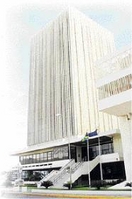Bank of Jamaica (BOJ cuts interest rate as T-Bill yield falls - Scotia follows suit
Published: Sunday | July 26, 2009

The Bank of Jamaica on Friday cut interest rates by one percentage point on all its open-market securities, a move that now more closely aligns the returns on its six-month tenor with the current performance of the benchmark treasury.
With the change, the BOJ's most expensive certificate of deposit to primary dealers is priced at 20.5 per cent, down from 21.5 per cent.
Hours later, at market close, Scotiabank Jamaica also announced it was cutting its lending rates by one per cent, effective August 3, from 21.5 per cent to 20.5 per cent to match the BOJ.
"The reduction in our lending rate at this time reflects our commitment to stimulating recovery in all sectors of the economy, at a very challenging time for retail, commercial and corporate borrowers," said Scotia Group Jamaica President Bruce Bowen in a company statement.
"At times like these, it is critical that senior decision makers in government, business and civil society show leader-ship by working together to build confidence in the business community and general public."
The new central bank signal rates now range from a low of 16 per cent on the 30-day CD to 20.5 per cent on the 180-day instrument (see insert).
The six-month July Treasury bill by contrast yielded 20.6 per cent at last Wednesday's auction, which was close to a point lower than the previous month's yield even though demand for the $400-million bond was strong. Subscriptions topped $1 billion.
It's not clear whether the rate cut is meant as a signal to International Monetary Fund officials, with whom Jamaica is now engaged in negotiations to borrow up to US$1.2 billion, though there has been speculation that the central bank and the Ministry of Finance have had differences over interest rate policy.
BOJ governor Derick Latibeaudiere had dismissed those speculations in an interview published in sister publication Wednesday Business saying fiscal and monetary authorities often had differences, but that he and the ministry had a common position in the IMF negotiations still under way.
Analysts immediately took the performance of the July treasury bond as a signal that the central bank would pronounce on rates, and warned that investors should expect lower returns on their portfolios.
"At yesterday's six-month T-bill auction, which was 155 per cent oversubscribed, the average yield fell to 20.6 per cent relative to 21.05 per cent in June," said Pan Caribbean Thursday in its 'Business Eye' newsletter to clients.
"Of note, the current yield is 90 basis points below BOJ's comparable rate. We expect BOJ to respond positively to this development."
BOJ said the rate cut was pegged on signs of improvement in the monetary environment, notably the expectations that the foreign exchange market will benefit from the stand-by IMF agreement, which will, the BOJ said, "pave the way for additional inflows from other multilateral institutions and a reduction in the Government's reliance on domestic financing".
The latter forecast, if realised, could drive down the price on new government debt issues, if the treasury's need is sufficiently fed by expectedly cheaper donor funds.
price adjustment
The BOJ said too that its action was pegged on the downward adjustment in prices. Annual inflation was down to 9.0 per cent in June from 24 per cent at June 2008, while fiscal inflation fell three points in the first quarter, from 12.4 per cent recorded at March 2009.
"This out-turn has been underpinned by continued stability in the foreign exchange market," said the BOJ in a statement released Friday.
"Additionally, the BOJ's gross foreign reserves have stabilised at US$1.6 billion."
The central bank's decision, announced an hour into trading Friday, appeared to have no impact on the stock market, which closed the day down 97 points at 80,117 on the broad JSE Market Index, though advancing stocks dominated losers six to four.
Analysts say the expected lower returns on securities will likely result in a boost for stock market activity, but only if more rates cuts occur this year.
"It could happen if JMA continues the pressure on Minister Shaw - Senator Wehby is out of the picture - and if the minister can persuade the BOJ," said one analyst who requested anonymity.
"But we never try to predict what the central bank would do."
Latibeaudiere, whose chief job includes control of inflation, uses interest rates to shield against depreciation of the JMD. The more the local currency loses value, the greater the likelihood of higher inflation, since more money is needed to buy the same amount of goods.
But as the IMF talks wind down to an agreement, the central bank says it anticipates continued stability in the foreign exchange market going forward, which would indicate it has less of an incentive to keep interest rates high.
"The prospects for continued stability in money and foreign exchange markets have been strengthened by the Government's decision to secure a stand-by arrangement with the International Monetary Fund," the BOJ said.
The JMD which lost 13 per cent of value last year, but has stabilised around J$89:US$1 in recent months, closed trading Friday, down one cent, at $89.10.
lavern.clarke@gleanerjm.com























